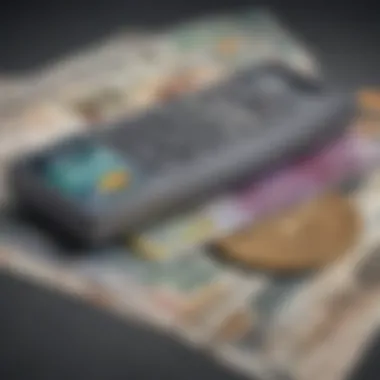Using Debit Cards for Money Orders: A Detailed Look


Intro
When it comes to managing finances, people often seek out flexible and convenient options for various transactions. One such option is the money order, a trusted method for sending and receiving funds securely. Many consumers may wonder whether it is possible to utilize debit cards to obtain these financial instruments and, if so, what that entails. This exploration delves into both the practicalities and intricacies of the process, providing a detailed examination of how debit cards fit into the realm of money orders.
Money orders serve multiple purposes. For example, they can be used for transactions requiring anonymity or where cash is not a viable option. Additionally, their inherent safety features—like being traceable and difficult to forge—make them an appealing choice for many. Yet, misconceptions abound regarding the methods of purchasing money orders, leading to confusion about whether debit cards are an option, along with their associated fees and policies.
In this analysis, we will navigate through the policies of various financial institutions, dissect the fees involved, and offer practical tips for leveraging debit cards effectively. On the journey, readers will equip themselves with knowledge not only to understand money orders better but also to enhance their financial transaction options.
"Understanding how debit cards can integrate into money order purchases is crucial to navigating the financial landscape effectively."
Establishing the necessary groundwork, we shall now shed light on the terminology and key concepts tied to this subject.
Understanding Money Orders
Money orders stand as a unique payment option within the financial landscape, often employed for specific transactions where traditional checks or cash may not suffice. Their significance in the monetary ecosystem comes down to several factors, particularly their ability to facilitate secure payments without requiring a bank account. Understanding money orders is crucial because they cater to a wide range of individuals, from those seeking anonymity in transactions to those who prefer a safeguard against fraud.
Definition and Purpose
A money order is fundamentally a prepaid document that confirms the purchaser has funds available to cover the amount stipulated on the order. Unlike a personal check, which can bounce if insufficient funds exist in the account, a money order guarantees the payee that the funds are secure. This instrument serves not only as a payment model for various services but also functions effectively in circumstances where one might be wary of personal checks or electronic transfers.
The purpose of money orders can be multi-faceted:
- Safety: They reduce the risk of losing cash in transit.
- Accessibility: Many retailers, post offices, and banks offer money orders, making them widely available.
- Anonymity: Users can make payments without linking to their bank accounts directly.
Therefore, the concept of a money order isn't just about facilitating transactions; it's about providing options that cater to diverse financial needs and preferences.
Common Uses of Money Orders
Money orders find themselves being utilized in a myriad of situations, each with a distinct purpose:
- Rent Payments: Many landlords prefer or demand money orders as a form of payment due to their reliability.
- Bill Payments: Utility companies or service providers often accept money orders as a secure form of payment, particularly for those who may not have online banking.
- Purchasing Goods and Services: Money orders can be used for a wide range of transactions, from buying goods online to donating to charities.
- Sending Money: They serve as an alternative to wire transfers, particularly for individuals who may not have access to banking services.
This flexibility makes money orders invaluable to those navigating various financial landscapes, reinforcing the need for a clear understanding of their function and benefit.
Payment Methods for Acquiring Money Orders
The process of acquiring money orders is an essential topic that deserves a closer look, particularly when it comes to payment methods. When individuals or businesses need to send funds securely, money orders serve as a viable option. Yet, the effectiveness of this mode of payment hinges on the methods employed to purchase them. It’s not just about handing over cash; various techniques can affect convenience, security, and overall costs associated with the transaction. Here, we will delve into both traditional payment options and emerging trends that are reshaping the way we approach money orders.
Traditional Payment Options
Traditional payment methods for money orders typically include cash, checks, and credit card options.
- Cash: The most straightforward method, cash payments ensure instant transactions without the need for identification. However, carrying large amounts of cash can pose risks.
- Checks: The use of personal checks adds a layer of formality. However, they can take time to clear, which may not serve urgent transactions well. Additionally, acceptance of checks may vary across money order issuers.
- Credit Cards: Utilizing credit cards may appeal for those who prefer to manage cash flow. Some locations allow this, but fees may apply, and not all issuers permit their use, especially for money orders.
Each traditional payment method holds its pros and cons. For instance, while cash is readily accepted, it creates challenges for those needing a paper trail. On the flip side, checks provide credibility but can delay transactions.
Overall, the key here is aligning payment methods with personal or business requirements. Choosing rightly can minimize hassles during money order acquisition.
Emerging Payment Trends
As technology continues to evolve, new payment methods are beginning to transform how we acquire money orders.
- Mobile Payments: Platforms like Venmo and Apple Pay are gaining traction. They offer immediate transactions, often syncing with user accounts effectively. However, acceptance for money orders can still be hit or miss, depending on the issuer's receptiveness to digital payments.
- Cryptocurrency: Although still in its infancy with this specific application, the use of Bitcoin and like currencies may catch on. While some people see the future in digital coins, their volatility and acceptance remain uncertain.
- Debit Cards: They're not just plastic cards for everyday purchases; the role of debit cards is expanding. Many financial institutions are starting to embrace them as a reliable option for money orders.
In summary, emerging trends offer exciting opportunities but come with caveats. Each option’s viability will heavily depend on the preferences of consumers, including their willingness to adapt and embrace new technologies. As the landscape changes, those involved in financial transactions must stay informed and flexible to optimize their money order procurement strategies.
The Role of Debit Cards in Financial Transactions
Debit cards play a pivotal role in modern financial transactions, bridging the gap between cash and credit. They are not just simple tools for withdrawing money; they embody a range of functionalities that cater to diverse consumer needs. In this article, we will explore how they affect transactions, specifically focusing on their use in acquiring money orders.


Overview of Debit Card Functionality
At their core, debit cards are linked directly to a user's checking account. This means that money spent via the card is drawn directly from the available balance, creating an immediate connection between the cardholder and their financial resources. This structure offers several advantages:
- Instant Transactions: Unlike credit cards, where purchases might lead to deferred payments, debit card transactions are handled in real-time.
- Ease of Use: Swiping a debit card typically involves simple procedures, often making the process straightforward compared to cash or checks.
- Transaction Tracking: Many banking apps accompany debit cards, enabling users to track spending easily, categorizing where and when money is spent.
Furthermore, in a world where cash is becoming less common, debit cards provide an essential means to engage in everyday transactions seamlessly. Their functionality extends into using money orders, transforming how consumers manage their payments.
Benefits of Using Debit Cards
Utilizing a debit card to acquire money orders offers distinct benefits that enhance user experience and convenience:
- Cost-Efficiency: Most debit cards come with lower fees compared to credit cards, especially when purchasing money orders. This aspect is particularly attractive for individuals who are budget-conscious and want to avoid incurring debt.
- Accessibility: Debit cards can be used at a vast array of locations, including larger grocery chains, convenience stores, and dedicated money order outlets. It's not uncommon for consumers to find these services available where they regularly shop, making transactions even more integrated into daily routines.
- Reduced Risk of Overspending: Since debit cards draw from existing funds, consumers can avoid the temptation to overspend as they might with a credit card. This financial control is vital when obtaining money orders, particularly for transactions that might otherwise stretch budgets.
According to financial experts, using a debit card rather than cash or checks can lead to better budgeting practices, especially for regular expenses.
In sum, debit cards furnish users with a versatile, user-friendly method for making financial transactions, including money orders. They not only simplify the payment process but also empower individuals with greater control over their spending. This makes them an increasingly vital component in the broader landscape of personal finance.
Can You Use a Debit Card for Money Orders?
Understanding the connection between debit cards and money orders is crucial for individuals navigating the financial transaction landscape. For many, money orders represent a safe and practical option for sending money without disclosing financial account details. Using a debit card for this purpose might appear straightforward, yet several layers complicate it.
The relevance of this section lies in exploring the operational and institutional frameworks that govern debit card usage for money orders. It's not merely about using a debit card; it's about knowing how and when one can effectively employ this payment method. Awareness of institutional policies allows consumers to circumvent unexpected inconveniences.
Additionally, identifying which debit cards are accepted at various outlets becomes an essential piece of the puzzle. This knowledge ensures that users can swiftly facilitate transactions, thus avoiding unnecessary delays or complications during what should be a simple financial exchange.
Institutional Policies on Debit Card Usage
When considering the use of debit cards to purchase money orders, one is often faced with a myriad of institutional policies that can either facilitate or hinder this process. Each financial institution may have its own set of rules that dictates how debit cards can be used. For instance, some banks allow customers to buy money orders directly at their branches, while others may impose restrictions on using debit cards in these transactions altogether.
Certain locations may even have limitations on transaction amounts. Often, these limits are put in place to reduce risks associated with fraud or to maintain orderly operations. It might be beneficial for users to check directly with the bank or money order issuer before attempting a purchase.
Understanding these policies can** help prevent misunderstandings** when trying to acquire a money order. In some cases, it's necessary to navigate through a maze of procedures. For example, not all retailers will accept debit cards for money orders, while others might prioritize particular card networks. Knowing these details preemptively can save consumers a lot of headaches down the line.
"Being informed about institutional policies can help consumers make wiser financial decisions, particularly regarding the use of debit cards for money orders."
Accepted Debit Card Types
Identifying the types of debit cards accepted for money orders is equally important. Generally, most retail locations and financial institutions accept major debit cards linked to prominent payment networks such as Visa, Mastercard, and sometimes even Discover or American Express. However, one must be cautious as there are instances when less common debit cards might be excluded.
Additionally, while certain prepaid debit cards may be usable, they can come with restrictions depending on where they are issued or the policies of the retailer. It is advisable to double-check if a particular prepaid card can be used for obtaining money orders, as not all institutions will recognize them as valid instruments for such transactions.
- Commonly Accepted Debit Cards:
- Cards Typically Not Accepted:
- Visa
- Mastercard
- Discover
- Store-specific debit cards
- Some lesser-known brands
The nuances of accepted debit card types emphasize the necessity for consumers to be prepared, asking questions beforehand if unsure about their card's eligibility. The financial landscape may change, and staying informed can greatly enhance the ability to transact smoothly. By having a clear understanding of which cards are valid, individuals can navigate the often complex world of money orders without unnecessary interruptions.
Fees Associated with Debit Card Transactions
When it comes to using debit cards for money orders, understanding the fees involved is crucial. These fees can significantly impact the overall cost of the transaction, and being informed can help individuals make smarter financial decisions. This section delves into various charges commonly associated with debit card transactions, what they mean for consumers, and how they compare to other payment methods.
Typical Charges Incurred
When you choose to buy a money order with your debit card, several charges might come your way. Here’s a rundown of the fees you might encounter:
- Transaction Fee: Many retail locations and banks impose a small fee for processing money orders, especially with a debit card. This could range from a dollar or two up to ten dollars, depending on where you are.
- ATM Fees: If you withdraw cash to buy a money order and you use a different bank's ATM, you could incur additional charges. This might include a withdrawal fee and even a surcharge from the ATM owner.
- Account Maintenance Fees: Some banks may have clauses that charge maintenance fees for certain types of transactions, especially if they see many debit card transactions for money orders.
- Overdraft Fees: If you aren’t careful and spend more than what’s in your account, you could face an overdraft fee, which is typically hefty.


To avoid these, it's key to read the fine print from both your bank and the service offering money orders. Understanding all potential fees can save you more than a pretty penny in the long run.
Comparative Analysis of Payment Methods
When evaluating which payment method to use for obtaining money orders, it’s helpful to consider the fees associated with debit cards compared to other options available:
- Cash: Using cash carries no fees, but it can be cumbersome to carry large amounts. Plus, there’s the risk of losing it.
- Credit Cards: Buying a money order with a credit card can lead to lofty fees as well as interest charges if you don’t pay it back promptly. Often, vendors view it as a cash advance; you might end up paying 3% or more on top.
- Prepaid Cards: These can also be used to purchase money orders. However, they may have activation and transaction fees that could rival those of debit cards.
- Online Payment Systems: Services like PayPal or Venmo offer conveniences but often involve service fees or percentage charges depending on how you're trying to fund the transaction.
In the grand scheme, while using debit cards has its fees, it can be seen as a balanced choice for many. The associated fees tend to be more straightforward compared to other methods, where hidden costs might turn up unexpectedly. By weighing all these factors, consumers can choose the payment method that best suits their financial situations.
"Understanding fees can sometimes feel like navigating a maze, but it’s crucial for informed financial decisions."
Integrating these insights effectively allows consumers to be ahead of the game when utilizing debit cards for money orders.
Advantages of Using Debit Cards for Money Orders
Using a debit card for your money orders is like having a reliable old friend at your side during a financial transaction; it brings numerous benefits that are hard to overlook. This section explores why debit cards can be a preferred method when securing money orders. We will discuss convenience factors and enhanced security features that come with this payment option. Doing so not only provides clarity but also sets the stage for a smarter approach to handling money orders.
Convenience Factors
In our fast-paced world, convenience often takes the front seat. Using debit cards for money orders checks that box effectively. For starters, most retailers and financial institutions accept debit cards, which means you don't have to hunt for the nearest ATM or a bank, especially when time is not on your side. You can simply walk into a location that provides money orders—like a convenience store or a supermarket—and make your purchase with a quick swipe.
Moreover, debit cards eliminate the need to carry cash. This is a boon for those who prefer to keep their finances in check without the hassle of dealing with loose bills or coins that can slip through your fingers like sand.
"Cash is a pain to keep track of; one minute you've got a handful, and the next, you’re scrambling to find where you put it. With debit cards, you always have precise control of your balance."
Another advantage is instantaneous transactions. When purchasing a money order with a debit card, funds are typically deducted from your account right away. This immediate gratification simplifies budgeting, ensuring you are always aware of your current balance. When you're using checks or cash, there's always a pending cloud of uncertainty about when the funds will actually leave your account.
Lastly, utilizing debit cards often results in faster processing times. Time spent standing in long lines can be minimized as many locations have integrated card payments. No one wants to be that person counting out cash while the line grows longer behind them.
Enhanced Security Features
Security is a critical consideration, especially in financial matters. Using a debit card offers several layers of protection that can make your money order transactions feel a lot safer. Firstly, with most debit cards, you will find ATM PINs or other forms of identification required for transactions. This reduces the risk of unauthorized access to your account.
Additionally, many financial institutions provide proactive measures against fraud. This can include monitoring your account for unusual transactions or enabling alerts for every purchase over a certain amount. Customers can set limits that encourage responsible spending—a feature that keeps tabs on how much is being spent without the common error of underestimating cash in hand.
In case your card is lost or stolen, prompt reporting can limit your liability for losses. This is not always the case with cash, where if you lose a wallet, it could be like tossing money out the window. Moreover, some debit cards come with purchase protection, where you can dispute charges or seek refunds under certain circumstances.
Finally, the added benefit of digital tracking is a practical advantage of using debit cards. Most banks have mobile apps or online platforms that allow you to monitor transactions in real-time. This feature can enhance your overall financial awareness, keeping you well-informed about your money's movement.
In summary, using a debit card for obtaining money orders provides remarkable convenience and noteworthy security. Whether it's about managing your time better, ensuring that your money is protected, or having an easier method for tracking your contributions, the advantages are significant and worthy of consideration.
Disadvantages and Challenges
Using debit cards for money orders seemingly offers a straightforward channel, yet it is not all sunshine and rainbows. While the benefits are often lauded, the disadvantages and challenges should not be swept under the rug. Recognizing these hurdles is crucial for individuals and businesses considering this method of payment. It's not only about the convenience of tapping your card at a terminal; it's also about navigating the complexities that come along with it.
Potential Restrictions from Issuers
Not every financial institution rolls out the welcome mat when it comes to debit card transactions for money orders. The first concern here is restrictions enforced by banks or card issuers. Many times, these restrictions stem from security protocols. Banks may worry that using a debit card to purchase a money order—a product usually used for larger sums of money—can lead to fraud or misuse.
- Some issuers may impose limits on how many money orders one can purchase within a certain timeframe. This can be particularly problematic for those relying on money orders for regular transactions, like paying rent or making business trades.
- Blocked transactions happen more often than one might think. If the transaction seems out of the ordinary—like an unusually large amount or a purchase from a location that’s not typical for the user—the bank may temporarily freeze the card, leading to unexpected complications.
- Fees may apply, as some banks categorize money order purchases differently, making it possible that you might get dinged with extra charges, leading to unanticipated costs.
To sum it up, it's vital to check your bank’s specific policies before trying to purchase a money order with your debit card. You don’t want a surprise at the checkout lane.
Possible Delays and Processing Times
Another thorn in the side of using debit cards for money orders is the potential for delays and longer processing times. You might think that a card transaction would be as quick as a flash, and in many instances, it can be. However, when you are talking about money orders, multiple factors can come into play.
- Transaction verification can take additional time, especially if the issuer needs to confirm the funds before allowing the purchase. This is particularly common if you're buying a money order for a substantial amount.
- Hiccups in the system can lead to processing delays. If the point-of-sale system experiences glitches or connection issues, you might end up waiting longer than expected.
- Follow-up, sometimes necessary, can also slow down the process. If a debit card transaction fails for some reason (like insufficient funds or contactless payment not going through), the customer may need to provide additional documentation or proof before a money order can be issued—adding yet another layer of complexity to an already tedious process.


In essence, while a debit card can simplify payments for money orders, it can also create its own web of complications that many may not anticipate. Being forewarned allows users to make informed decisions and prepare accordingly.
Alternatives to Using Debit Cards for Money Orders
In today’s fast-paced financial landscape, understanding the nuances of various payment methods is crucial. Using debit cards for money orders comes with certain limitations and challenges. For this reason, exploring alternatives becomes not just beneficial, but sometimes necessary. Each method holds its own set of advantages and drawbacks that can cater to varied financial needs. Recognizing these options will empower users to make informed decisions that align with their unique circumstances.
Prepaid Cards
Prepaid cards are like a budgeted expenditure account in physical card form. They can be loaded with a specific amount of money and used directly for transactions. Since they don’t tap into a traditional bank account, they allow for a good sense of control over spending.
- Ease of Use: Similar to debit cards, they are widely accepted and simple to use. This makes them a practical choice for purchasing money orders.
- Anonymity: Prepaid cards offer enhanced privacy since they're not linked to anyone’s name, offering a layer of anonymity that might be desirable in certain transactions.
- Budgeting Tool: They can serve as an excellent budgeting aid, preventing overspending as you can only use what’s loaded onto the card.
- Limitations: However, users should be aware of potential fees and restrictions that can vary based on the card issuer. It’s also vital to ensure the card can indeed be used for acquiring money orders, as not all issuers allow this.
Wire Transfers
Wire transfers stand as one of the oldest ways to send money. They provide a secure and quick way to transfer funds directly from one bank account to another. This might not scream convenience on the surface, but when it comes to large amounts or urgent needs, they shine.
- Speed: Wire transfers are often instant, or can be completed within a day. This is especially useful when one needs to get a money order without delay.
- Security: The process is generally secure as it goes directly through financial institutions, thus minimizing the risk associated with carrying cash or physical checks.
- Fees: On the flip side, wire transfers can come with their own set of fees, which can be significant depending on the amount being transferred and the institutions involved.
A wire transfer may not provide the anonymity that prepaid cards do, but its reliability makes it an option worth considering.
PayPal and Similar Services
As technology advances, digital payment platforms like PayPal offer a modern twist to traditional methods. These services provide users with convenient ways to manage their finances online.
- Convenience: Sending money online with a few clicks can’t be overstated as it saves time and effort. Many money order services accept PayPal as a form of payment, leading to a straightforward process.
- Linked Accounts: Users can link their bank accounts or debit cards to their PayPal account, facilitating smooth transactions while keeping personal banking information private.
- Protection and Disputes: These platforms also come with buyer protection policies that can be beneficial in case something goes wrong with the transaction.
- Drawbacks: Yet, just like with other services, transaction fees and instantaneous disputes can be hurdles when transactions do not go as planned or appear to be mistaken.
Ultimately, exploring these alternatives can offer financial actors a suite of tools that come with varying benefits and constraints. In using any of these options, it is vital to assess personal needs against the potential drawbacks of each method to ensure an informed decision remains at the forefront.
Real-World Scenarios
In today’s fast-paced world, the ability to effectively manage financial transactions is crucial. The use of debit cards for money orders is a topic that draws interest and pertinent discussions among investors, financial advisors, and anyone looking to execute secure transactions. Understanding the real-world scenarios surrounding this practice not only illuminates its significance but also emphasizes its practical implications.
Business and individual transactions often necessitate a heightened sense of security and convenience, and that’s where debit cards come into play when obtaining money orders.
The flexibility and responsiveness offered by debit cards can bridge gaps in traditional banking methods. As money orders are widely accepted and can facilitate payments in situations where checks are impractical or cash isn’t feasible, their combination with debit cards allows for smoother transactions, especially during urgent financial exchanges.
"In every financial transaction, the safety and accessibility of payment methods play a pivotal role not just in securing funds but in fostering trust between parties involved."
Case Studies of Successful Transactions
In exploring successful transactions utilizing debit cards for money orders, three key case studies stand out. These examples illustrate how various individuals navigated their unique hurdles by strategically employing debit cards.
- The Online Seller's Strategy: A small business owner frequently sold handmade crafts online. In a bid to avoid high PayPal fees, they opted to buy money orders with their debit card instead of receiving payments through digital wallet options. This method provided a tangible record while saving money on transaction fees.
- Urgent Payment Needs: A tenant faced a last-minute rent payment deadline. With limited access to cash and the landlord's firm preference for money orders, the tenant quickly bought a money order using their debit card at a local grocery store. This swift decision not only saved them from potential late fees but also kept their landlord satisfied.
- Financial Independence for Students: College students often encounter various payment challenges. One student utilized a debit card to purchase money orders for tuition payments after realizing the benefits of security and the elimination of carrying large sums of cash—a savvy move that alleviated worries about theft or loss.
Common Pitfalls to Avoid
Even with the advantages presented by debit cards, there are specific pitfalls to be aware of when using them for money orders. Understanding these can help individuals navigate their financial transactions more cautiously:
- Insufficient Funds: One primary concern is the risk of insufficient funds. Without checking their account balance beforehand, a user might face a declined transaction, which can disrupt plans.
- Transaction Fees: While some might think of debit card purchases as fee-free, certain retailers impose transaction fees when buying money orders with a debit card. It’s essential to ask or check ahead of time to avoid unpleasant surprises.
- Institutional Limitations: Not all financial institutions permit the use of debit cards for acquiring money orders. Before attempting a transaction, it’s crucial to consult your bank or credit union about their policies.
- Fraudulent Activity: Finally, users should always be aware of potential fraud. They must ensure their card details are secure when making transactions and should track their purchases diligently to identify inadvertent charges.
Final Thoughts and Considerations
In wrapping up our exploration of using debit cards for money orders, it's crucial to reflect on the multifaceted nature of the topic. Several elements need addressing for readers to grasp the benefits and drawbacks of this payment method fully. Each reader's experience will vary, influenced by individual circumstances, preferences, and local banking regulations. Thus, understanding these nuances becomes integral.
Evaluating Payment Options
When it comes to deciding how to fund your money order, it helps to lay out the options on the table. Various methods each offer distinct advantages:
- Cash: It’s universally accepted but may present safety concerns if large amounts are involved.
- Debit Cards: Convenient for those who prefer electronic transactions. Much depends on the issuer's policy.
- Prepaid Cards: Also a viable choice if your primary card has restrictions, albeit some fees can apply.
- Wire Transfers: Fast and secure but can rack up charges, depending on the institution.
Considering these avenues allows individuals to weigh the pros and cons effectively. A buyer can determine what balances convenience with cost. As one walks through these options, examining the specific fees and the processing speeds associated with each can often illuminate the best route to take depending on the scenario at hand.
Future Trends in Payment Methods
Looking into the crystal ball, it's evident that the financial landscape is shifting rapidly. A few trends are emerging related to payment methods for money orders:
- Increased Digital Integration: More financial institutions are developing mobile apps that allow users to purchase money orders directly online using debit cards. The transition to remote transactions promises to shift user experiences significantly.
- Blockchain and Cryptocurrencies: With digital currencies gaining traction, it's worth pondering how they might affect traditional money orders. These technologies could simplify transactions and enhance security in the future.
- Regulatory Changes: As payment methods evolve, regulatory frameworks will likely adapt to provide clarity and security. New rules around electronic payments and user protections could change the landscape, making some methods more favorable.
Ultimately, as consumers and businesses alike become more digitally savvy, understanding the ramifications of these trends is essential for anyone navigating the financial waters. Keeping an ear to the ground on these changes ensures greater preparedness for future monetary dealings.



